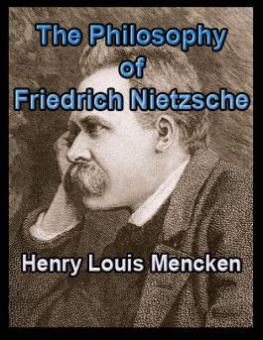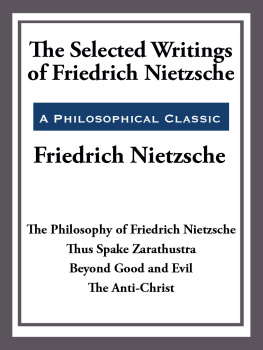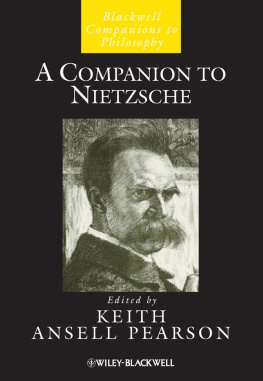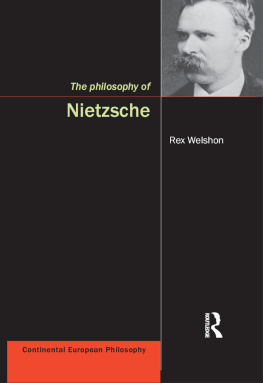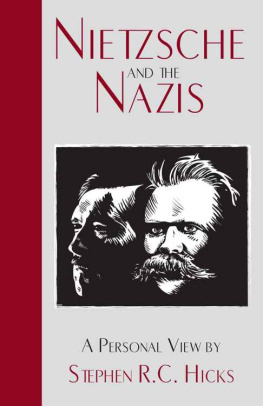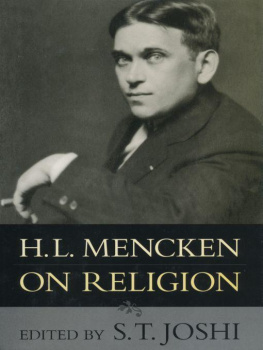Henry Louis Mencken
1908 Content
Introduction NIETZSCHE THE MAN
Boyhood And Youth The Beginnings Of The Philosopher Blazing A New Path The Prophet Of The Superman The Philosopher And The Man
NIETZSCHE THE PHILOSOPHER
Dionysus Vs. Apollo The Origin Of Morality Beyond Good And Evil The Superman Eternal Recurrence Christianity Truth Civilization Women And Marriage Government Crime And Punishment Education Sundry Ideas Nietzsche Vs. Wagner
NIETZSCHE THE PROPHET
Nietzsche's Origins Nietzsche As A Teacher Nietzsche And His Critics Introduction
THE philosophy of Friedrich Nietzsche and the music (and quasi-music) of Richard Strauss: herein we have our modern substitutes for Shakespeare and the musical glasses. There is no escaping Nietzsche. You may hold him a hissing and a mocking and lift your virtuous skirts as you pass him by, but his roar is in your ears and his blasphemies sink into your mind. He has colored the thought and literature, the speculation and theorizing, the politics and superstition of the time. He reigns as king in the German universities where, since Luther's day, all the world's most painful thinking has been done - and his echoes tinkle, harshly or faintly, from Chicago to Mesopotamia. His ideas appear in the writings of men as unlike as Roosevelt and Bernard Shaw; even the newspapers are aware of him. He is praised and berated, accepted and denounced, canonized and damned. Pythagoras had no more devout disciples and Spinoza had no more murderous and violent foes. Wherefore it may be a toil of some profit to examine his ideas a bit closely; to differentiate between what he said in his books and what his apostles and interpreters and enemies say or think he said; and in the end, perhaps, to find out what he meant.
Despite the notion of those who know him but by name or ill-fame, there is nothing cryptic or mysterious about Nietzsche. His ideas are ever clear. Curiously enough, the popular comprehension of his philosophy suffers by this very fact, for the world has come to regard the metaphysic as something properly and necessarily occult and to expect its expounders, if they would seem truly wise, to show the abysmal turgidity of a Kant and the wild, cabalistic imbecility of Revelations. When there arises a prophet like Nietzsche, who thinks his thoughts accurately and puts them into the vulgar tongue, he is commonly suspected to be some sort of fantastic and preposterous joker. Instead of accepting his prophecy in its surface sense, his audience sees, in its very obviousness, a new and extraordinarily confusing form of riddle. Such is the curse that rabbinism, in and out of the church, has laid upon the propagation of ideas.
Nietzsche's literalness is the hallmark of his entire philosophy. He is the high priest of the actual, and the divine mysteries seem to him to be but so many grotesque lunacies. Stripping an idea of its holiness and romance, its antiquity and authority, he burrows down into the heart of it and tries to estimate it in terms of its actual probability and reasonableness. That a thing is sacred or venerable or ancient or beautiful does not interest him. The question is asked invariably, Is it true? If he concludes that it is not, he says so, and if it happens to be something that is regarded with unusual reverence by the majority of men - which means something whose inviolability is accepted without inquiry or the shadow of doubt - he says so with unusual heat and clamor. He is, indeed, the king of all axiom smashers and the arch dissenter of the age. To him such words as good and godly have no meaning whatever. He regards them as mere scarecrows and bugaboos, invented and employed by sophists and doctrinaires to ward off that free inquiry which would put their fallacies to rout.
Reduced to elementals, Nietzsche's philosophy consists of the following propositions:
That the ever-dominant and only inherent impulse in all living beings, including man, is the will to remain alive - the will, that is, to attain power over those forces which make life difficult or impossible.
That all schemes of morality are nothing more than efforts to put into permanent codes the expedients found useful by some given race in the course of its successful endeavors to remain alive.
That, despite the universal tendency to give these codes authority by crediting them to some god, they are essentially man-made and mutable, and so change, or should change, as the conditions of human existence in the world are modified.
That the human race should endeavor to make its mastery over its environment more and more certain, and that it is its destiny, therefore, to widen more and more the gap which now separates it from the lower races of animals.
That any code of morality which retains its permanence and authority after the conditions of existence which gave rise to it have changed, works against this upward progress of mankind toward greater and greater efficiency.
That all gods and religions, because they have for their main object the protection of moral codes against change, are inimitable to the life and wellbeing of healthy and efficient men.
That all the ideas which grow out of such gods and religions - such, for example, as the Christian ideas of humility, of self-sacrifice and of brotherhood - are enemies of life, too.
That human beings of the ruling, efficient class should reject all gods and religions, and with them the morality at the bottom of them and the ideas which grow out of them, and restore to its ancient kingship that primal instinct which enables every efficient individual to differentiate between the things which are beneficial to him and the things which are harmful.
Here we have the bare framework or skeleton of Nietzsche's system. How it leads to a rejection of Christianity and democracy; how it points out a possible evolution of the human race through the immoralist to the superman; how it combats the majority of the ideas held holy and impeccable by mankind today - all of this is set forth in the pages that follow. The aim of this book is to translate Nietzsche into terms familiar to everyone - to show the exact bearing of his philosophy upon matters which every man must consider every day. Nietzsche dealt chiefly with generalizations and abstractions, and when he descended to imminent concerns he naturally selected those things which most interested his countrymen. In this book his conclusions are applied to the things which most interest the two great races whose tongue is English. To this extent paraphrase has been admitted, but in all statements of fundamental doctrines there has been a faithful and literal rendering of the original text - a rendering interrupted, of course, whenever it has seemed necessary to explain or elucidate, by foot-note, parable or digression.
In the biographical portion of this book an effort has been made to show the growth of Nietzsche's system, from its beginning in mute consciousness to its maturity in clear and unmistakable propositions. In the last part an attempt has been made to trace out the origin of this system in the ideas of other men; to show how it agrees or disagrees with human experience; and finally, to estimate its influence upon the great and little men of the world today and its probable influence tomorrow. It is high time for the race of Darwin and Huxley to know Nietzsche better. When his ideas are calmly weighed, they may be rejected, but it will be infinitely better to weigh and reject them thus than to condemn them out of hand and without knowing what they are.
Nietzsche himself believed that he was but a link in an endless chain and that, in the course of time, his doctrines would be overthrown by the philosophy of better men. Be this as it may, the fact is apparent that he fought a good fight and made his fellow men his debtors. Error was his enemy and he was ever merciless in combating it, even when the combat meant a war upon himself. He attacked men, gods and devils, but his purpose was ever the lofty one of discovering the truth. It is the fashion among the adherents of the old order to berate him for his ferocity, and to urge the sorrows of his darkened life against him, but some day, perhaps, the world will learn to give men of his kind the honor that is their due. It is a fine thing to face machine guns for immortality and a medal, but isn't it fine, too, to face calumny, injustice and loneliness for the truth which makes men free?

